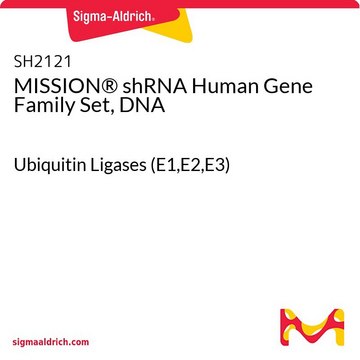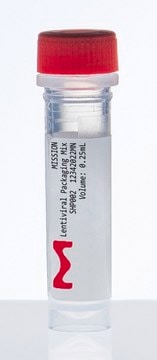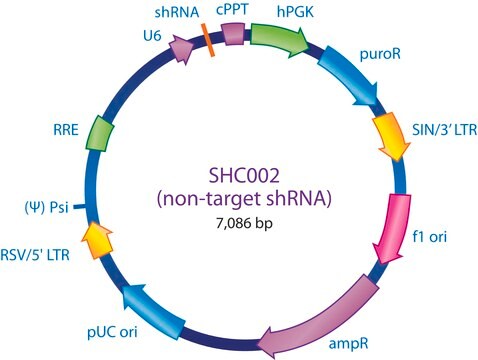推荐产品
一般說明
The clones are sequenced-verified shRNA lentiviral plasmids (pLKO.1-puro) provided as 50 μl bacterial glycerol stocks (Terrific Broth, carbenicillin at 100 μg/ml and 15% glycerol). The set comes in 96-well plates that are barcoded for simple identification. A CD containing RefSeq, gene description, gene symbol, clone ID, hairpin sequence, locus link, and plate map positions are provided with the gene family set.
其他說明
Each MISSION shRNA clone is constructed within the lentivirus plasmid vector, pLKO.1-Puro, followed by transformation into Escherichia coli. The pLKO.1-Puro vector contains bacterial (ampicillin) and mammalian (puromycin) antibiotic resistance genes for selection of inserts in either bacterial or mammalian cell lines. Each clone set consists of an average of 3-5 constructs that have been designed against each target gene using a proprietary algorithm. Therefore, a range of knockdown efficiency, with at least one construct from each gene set being >70%, can be expected when using these clones. This allows one to examine the effect of loss of gene function over a large series of gene knockdown efficiencies. Each shRNA construct has been cloned and sequence verified to ensure a match to the target gene.
For a detailed listing of other available gene family sets, visit the gene family set website.
Number of Genes: 341, Number of Clones: 2081
The exact gene and clone count at time of purchase may vary slightly as the TRC library is continually updated.
法律資訊
Use of this product is subject to one or more license agreements. For details, please see http://sigmaaldrich.com/missionlicense .
MISSION is a registered trademark of Merck KGaA, Darmstadt, Germany
Timothy Cardozo et al.
BMC biochemistry, 8 Suppl 1, S9-S9 (2007-12-06)
Recently, the ubiquitin proteasome system (UPS) has matured as a drug discovery arena, largely on the strength of the proven clinical activity of the proteasome inhibitor Velcade in multiple myeloma. Ubiquitin ligases tag cellular proteins, such as oncogenes and tumor
Kim Newton et al.
Cancer investigation, 25(6), 502-513 (2007-09-21)
The regulated degradation of cellular proteins by the ubiquitin-proteasome system impacts a range of vital cellular processes in both normal and cancerous cells. An ubiquitin-activating enzyme (E1), ubiquitin-conjugating enzyme (E2), and ubiquitin ligase (E3) catalyzes the conjugation of the protein
我们的科学家团队拥有各种研究领域经验,包括生命科学、材料科学、化学合成、色谱、分析及许多其他领域.
联系技术服务部门






